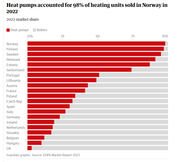I'm not disagreeing with the goal of zero residential gas use, merely attempting to illustrate a problem with a usage tax on gas and some of the knock on effects.
I own my house (well, mortgaged, but whatever). Remove the planning permission barrier and I have a simple economic incentive to swap to a heat pump if it becomes cheaper to run than a gas boiler (I already have an ethical incentive), so a tax on usage can work to change my behaviour.
Occupiers of privately rented dwellings have no control over the presence of a gas boiler. It doesn't matter how high a tax is on gas, levied via a usage tariff paid by the occupier, because it does not act as an incentive on the landlord to change to an electric heat pump. Doesn't matter if it's 1% or 1000%, unless the tax is racked so high that it is actually cheaper to make the tenant put in the HP and hence acts as a wealth transfer from poor to rich.
Part of the issue is that any attempt to tax the landlord ends up with the landlord passing as much of hte cost onto the occupier, which is where (I think) statutory obligations need to be utilised, to force the incentive onto the owner (klandlord) and not the occupier.
One example, is imagine this: what if there was alaw which set a date, say 1/9/2030 - beyond which no privately rented accomodation could have rent charged whilst the only source of heating was a gas boiler (the wording should probably be: has a gas supply to the property). Now the landlord have an incentive to ensure that there are no gas boilers present. If they try to sell up though, there are knock on effects for the housing market which can become quite unusual but also is likely to push out smaller landlords and increase larger corporations which own portfolios of property. So ther is another problem which needs to be managed.
But let's carry on with the scenario. We've just increased the demand on the HP supply, so we need to either manufacture or import the equipment in short order. We're going to see a price increase just like we did in Covid with solar PV and batteries due to the spike. We're already looking at a production gap, so we need to choose a date which works best - but landlords will put off the expenditure anyway so delaying doesn't happen. So we need phased increases, so need to start measuring portfolios of property to measure what percentage is gas and what percentage is electric. Oh wait, what if the landlords cheap out and just move to an electric boiler? I worked out that it would take the entire after tax, pension and student loan wage of a new band 5 NHS (ie newly qualified nurse) to heat the average 3 bed property in the winter months (or rather, at the winter 22 electricity prices, with the cap in place, so it would be a little lower at this point) using an electric boiler. So we already have problems there as well, need to stop land lords being cheapskates.
I'll stop at this point, because I've gone far enough, but I think the following steps need to be taken along with a tax on gas.
- Planning permission needs to be relaxed for heat pump installs, especially in terraced housing.
- Significant control is needed to enforce insulation of privately rented properties, with a due by date will before any enforced date affecting ending gas boiler use and installation.
- Given that energy use and the housing market are closely linked, there will need to be robust and decisive governmental control (lol) over policies similar to "Right to buy" as a back stop, so landlords that try to sell privately rented properties and forced to sell to the tenants in the first instance to stop a glut of properties hitting the market, realistically this needs to be followed up with a similar scheme help to buy loans.
- There does need to be a state owned company (realistically it would probably be commissioning companies to act on it's behalf in the near term, similar to NHS commissioning) to act as a ceiling price enforcer for solar PV, batteries, heat pumps and insulation to stop profiteering. Grants are a stupid way to manage the system, this way. Ideally this would be managed at local authority level so it could be integrated with housing plans.
- A tax on gas used by powerplants would only work if the price gas powerplants is paid for power is completely decoupled from RE prices, otherwise we just get inflationary costs
To repeat, I agree with the zero gas use goal, but I think a tax is just harder to justify. It's actually simpler if it's outlawed sector by sector, as it's easily controlled by just turning off sections of the network.
